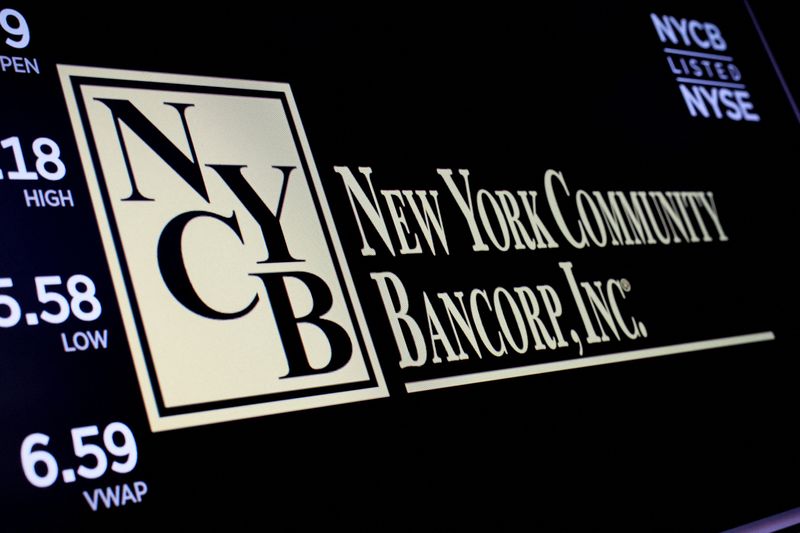By Niket Nishant and Saqib Iqbal Ahmed
(Reuters) -Shares of New York Community Bancorp (NYSE:NYCB) lost 22% on Tuesday, extending a sell-off since the lender reported a surprise quarterly loss last week, as Moody's (NYSE:MCO) downgraded its long-term debt ratings to junk status.
The stock closed at $4.20 and is on track to shed more than half of its value at the current levels.
The frenzied selling since Wednesday has also dragged down shares of peers on renewed fears about the health of the industry, which for months has been worried about exposure to the beleaguered commercial real estate (CRE) sector.
Ratings agency Moody's late on Tuesday downgraded all of NYCB's long-term ratings from Baa3 to Ba2, which is considered a junk rating.
"NYCB's core historical commercial real estate lending, significant and unanticipated loss on its New York office and multifamily property could create potential confidence sensitivity," a Moody's statement said.
"The company's elevated use of market funding may limit the bank's financial flexibility in the current environment."
NYCB last week set aside bigger-than-expected provisions for potential bad loans, chiefly due to its exposure to CRE where several borrowers are at risk due to high interest rates and low occupancies.
"The Moody's downgrade is not expected to have a material impact on our contractual arrangements," NYCB Chief Executive Officer Thomas Cangemi said late on Tuesday.
"Despite the Moody's ratings downgrade, our deposit ratings from Moody's, Fitch and DBRS remain investment grade," he said, adding that the bank was in the process of bringing in a new chief risk officer and chief audit executive with large bank experience.
As of Feb. 5, NYCB's cash held on balance sheet was about $17 billion and its total deposits rose slightly to about $83 billion, compared to $81.4 billion at the year end.
"There's a lot of anecdotal evidence that it's grim out there in CRE and indeed that may be getting even worse than folks are allowing people to know, at least in terms of office real estate," said Russell Hackmann, founder of Hackmann Wealth Partners.
U.S. Treasury Secretary Janet Yellen also acknowledged CRE concerns and said the Financial Stability Oversight Council, a body made up of multiple regulators, was focusing on the matter.
The KBW Regional Banking index dropped around 1.4% on Tuesday. The index has been hit even as analysts highlighted that the issues at NYCB were specific to its balance sheet.
The lender's assets breached a $100 billion threshold after it purchased Signature Bank (OTC:SBNY) last year, subjecting it to stricter regulatory requirements and prompting a dividend cut to build capital.
The decision to make the cut came after mounting pressure from the Office of the Comptroller of the Currency (OCC), a top banking regulator, Bloomberg News reported on Monday.
The lender's market value has fallen to about $3.5 billion since its earnings report, a far cry from its peak value of nearly $10 billion in August.
At least 13 brokerages have downgraded or lowered their price targets for the bank's stock since the earnings report.
Fitch also downgraded the bank's credit rating last week, citing the increased regulatory requirement that the agency said would curtail NYCB's "flexibility" as it focuses on building capital.
The size of provisions the bank took were also "outside of Fitch's baseline expectations," the ratings agency said.
On Tuesday, NYCB was sued by shareholders in a proposed class action for allegedly concealing deterioration in its loan portfolio. The complaint was filed in Brooklyn federal court.
STIRS UP OPTIONS ACTIVITY
The slump in NYCB's stock has kickstarted heightened activity in the options market. NYCB options were changing hands at 11 times their usual pace, according to Trade Alert data.
Put contracts, typically bought to express a bearish or defensive view, outnumbered calls, generally a bullish play, nearly 5-to-1, the data showed.
The bank's 30-day implied volatility - or how much traders expect the bank's shares to swing in the near term - rose to 170%, the highest in at least four years, Trade Alert said.
The broader Regional Banking exchange-traded fund (ETF) also drew heightened options activity, though at a more moderate level, suggesting investors were more focused on NYCB's prospects rather than on the broader regional banking sector.
The 30-day implied volatility for the ETF slipped to 33%, down about a point from the 3-month high touched on Wednesday, according to the data.
The plunge in NYCB's stock has enriched short sellers, investors who profit from a slide in stock prices. Such investors have made roughly $159 million in paper profits on NYCB since it reported results, according to data from Ortex.
